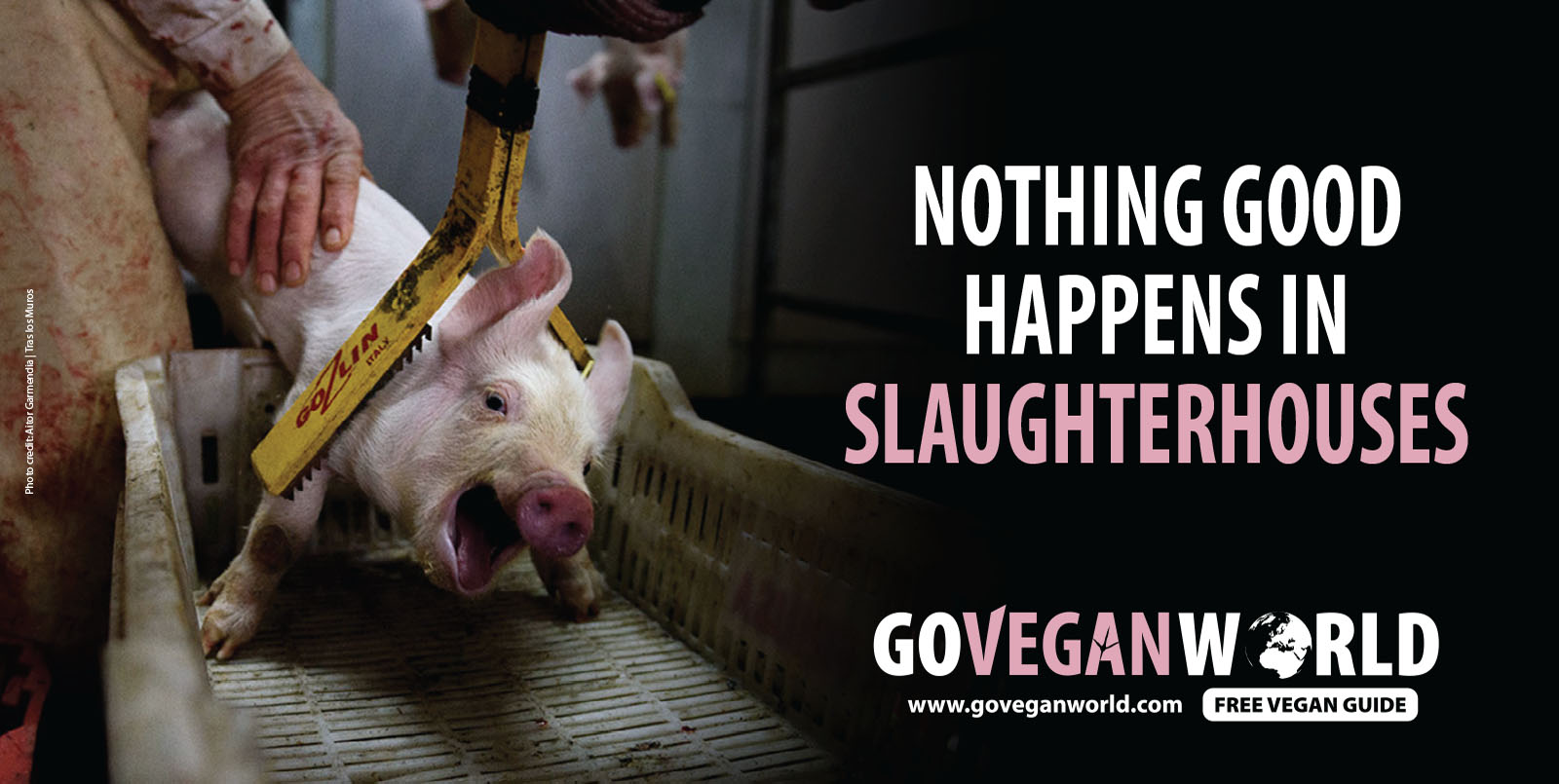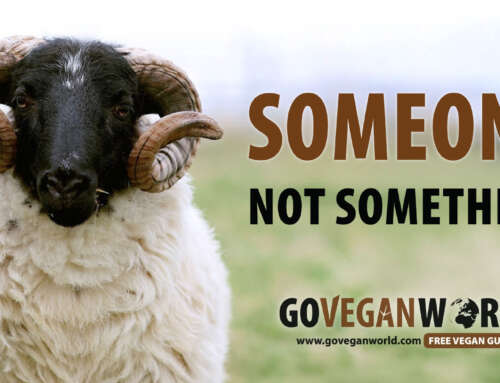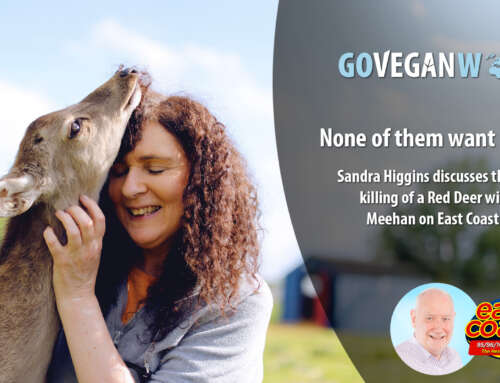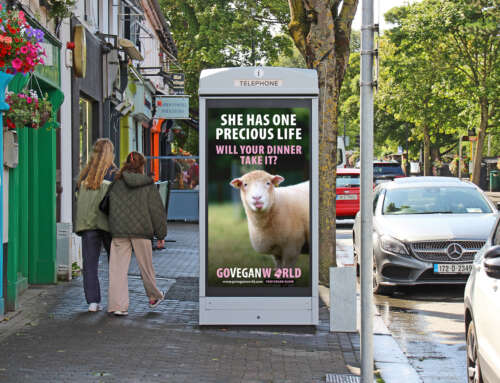Non-Veganism and the Justification of Animal Use
05.01.2025
Most people consider themselves to be decent individuals who do not unnecessarily harm others, human and non-human. Most people are also not vegan and they are aware that for us to use the products and bodies of other animals, they suffer and are killed. While they may not be aware of the gruesome intricacies of using other animals as food, entertainment, labour, in research and education, they are aware that it is sufficiently horrific for them to want to avoid knowing. While they may not be aware of how animals are exploited for dairy and eggs, everyone knows that to eat the flesh of a fish or land animal, that animal had to be killed.
Justifying Animal Use
So if most of us are vaguely aware of the horror of animal use and are fully aware that animals die for our benefit, how can we justify thinking of ourselves as decent people yet continue to use other animals? One explanation is that non-vegans use justification strategies to reduce the moral discomfort of living in ways that are unfair to other animals. This is what is referred to in scientific literature as the ‘meat paradox‘, with similar cognitive dissonance strategies being found to reduce the moral discomfort experienced by those who consume eggs, dairy and fishes. Various justifications are used such as denying that other animals are sentient beings who have minds, value their lives, and can suffer; appealing to what we refer to as the four N’s (regarding the use of other animals as ‘normal, natural, necessary and nice/palatable’); believing that caring about one species of animal (for example companion dogs and therefore being against puppy farms or caring about free living animals and being against hunting) absolves us of the moral obligation to respect equally sentient animals such as farmed animals used for food and clothing, laboratory animals used in research, and other animals used for labour, education and entertainment.
All of these justification strategies serve to reduce the moral discomfort experienced by non-vegans and enable them to continue using other animals. They are further enabled by the strategies used by the industries that profit from animal use. Some of the strategies used by the industry include perpetuating the myth that animal use is necessary (for health reasons or to support the income of farmers), divorcing the end products of animal use from the sentient beings who were bred to live short, miserable lives before being killed for profit; justification of standard, legal animal practices (justifying the separation of newly born animals from their mothers in the dairy industry on so called health grounds); denying the facts of animal use (e.g. promoting animal agriculture as environmentally beneficial when in fact it is an environmental disaster); and planting seeds of doubt in the minds of the public who may otherwise consider going vegan). Animal agriculture, in particular, is powerful and influential and those who profit most from it, go to enormous lengths to challenge attempts to expose it for the unjust, damaging and unnecessary industry it is (Monbiot, 2023).
Among the justification strategies most often encountered by us at Go Vegan World are statements such as ‘I rarely eat meat’, ‘animal products are necessary for human health’, and ‘farmers treat their animals very well’.
‘I rarely eat meat/eggs or drink milk’
Even if you only rarely consume a particular animal product, for the animal who produced that product, whose freedom was taken from them, whose entire life was used and exploited for you who paid for their egg, skin, milk or flesh, and who died because you chose to pay someone to exploit and kill them, it doesn’t matter than you only rarely consume animal products. Like you, they only have one life. They only experience their own, subjective life and they only lose their own life. Your choice only impacts them.
‘Animal Products are Necessary for Human Health’
We appreciate the power of an industry that has foisted the myth of the necessity of animal products on an uneducated public. Most of us were cared for by parents who were victims of the influence of the animal agriculture industry on the dietary recommendations for themselves and their children. But science demonstrates that animal products are not necessary at all for human health. With a little care, it is easy to get all the nutrients we require for optimal human health on a 100% plant diet. We need to be careful to ensure an adequate source of essential nutrients such as B12 and consume sufficient calcium but we do not need to consume animal products to obtain these nutrients. For further information, we highly recommend that you read the nutrition and diet sections of this website and consult information supported by registered dietitians.
‘Farmers treat their animals very well’
Other animals share our human right not to be owned or used as the property of another. In that sense, farmers do not ‘own’ other animals. All farmed animals today are the descendents of the free living animals who were corralled by humans and taken to be controlled, exploited and killed for our benefit (Nibert, 2013).
Animal Welfare Guidelines are irrelevant to our Moral Obligation to be Vegan
How farmers treat the animals they exploit is largely irrelevant when they are breeding them for profit with the intention of killing them. Most people think of animal welfare as being a set of guidelines that ensures that the animals we use at least have decent, comfortable lives before they are killed. But if you claim that other animals matter and that it is wrong to unnecessarily harm or kill them, then it should immediately be obvious to you that animal welfare guidelines actually harm rather than protect other animals. They give the appearance that the animals we use unnecessarily and unjustly are being cared for when, in fact, an industry that is designed around causing harm and killing anyone is the furthest thing imaginable from one’s welfare being considered and protected. If you have a look at the animal welfare legislation, you will find that it describes how to breed, exploit and kill other animals. While is prescribes the minimum conditions necessary to ensure that other animals stay alive while they are being exploited, that merely serves to ensure that farmers achieve maximum profit with the least amount of inputs to ensure the animals can lay eggs, gain weight, produce milk, and survive until they arrive at the slaughterhouse. A closer look at the animal welfare guildelines reveals recommendations for gassing or mincing day old chicks in the egg industry, how to mutilate animals by freeze branding, castrating and dehorning them, and how to kill them. If they were human we would very quickly see ‘welfare guidelines’ for what they are: a camouflage for a horrific industry to assuage the conscience of non-vegans and thereby maintain a market for the products of animal use.
Confronting Injustice: Dismantling Justifications to Animal Use
One of the aims of Go Vegan World is to dismantle the misinformation of the animal using industries and to confront the personal justifications used by non-vegans that enable them to feel comfortable about animal use. Our non-compromising public adverts confront members of the public with the inside facts of animal use as experienced by the young, sentient animals whose liberty we take, whose rights we violate, and whose misery and deaths we pay for every time we make a non-vegan choice.
To that end, this is the billboard we have chosen to run for our New Year campaign in Ireland. It shows that other animals are sentient, feeling beings who experience fear and pain when their lives are taken from them. It is a direct contradiction to the many justifications used by non-vegans in an effort to feel more comfortable about their choice to continue using other animals.
For more information and support to go vegan, please download our free vegan guide.
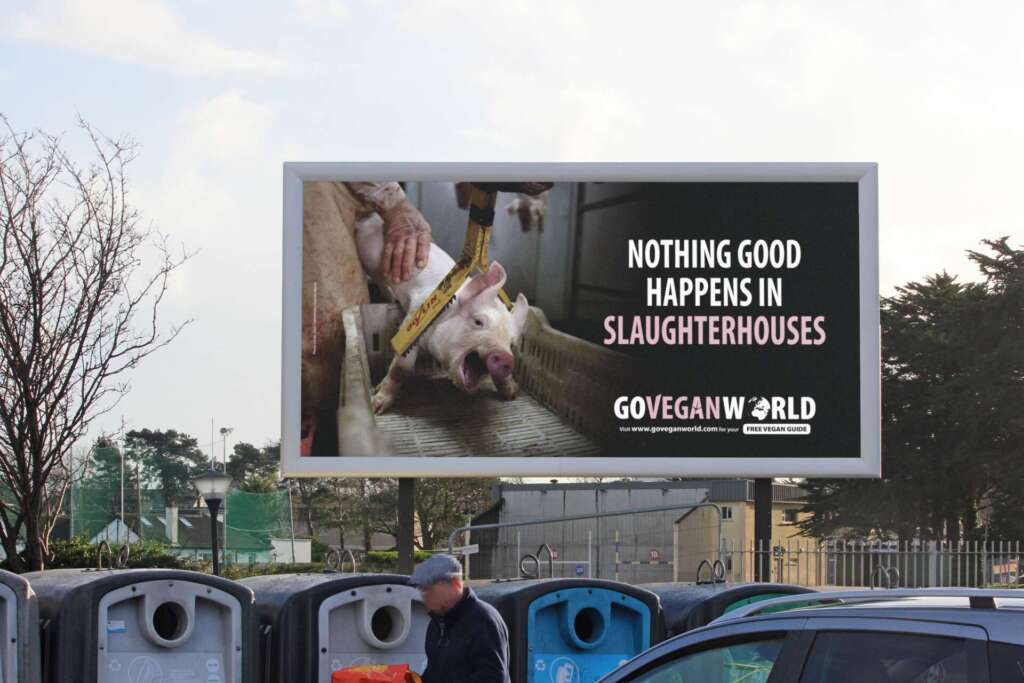
References:
Aronson, Dina, Demystifying Vegan Nutrition: A Starter Guide, https://www.internationalvegan.org/nutrition/
Bastian, B., & Loughnan, S. (2017). Resolving the Meat-Paradox: A Motivational Account of Morally Troublesome Behavior and Its Maintenance. Personality and Social Psychology Review, 21(3), 278-299. https://doi.org/10.1177/1088868316647562
Bully Beef, George Monbiot, December 2023 https://www.monbiot.com/2023/12/21/bully-beef/
Council Regulation (EC) No 1099/2009 of 24 September 2009 on the protection of animals at the time of killing https://eur-lex.europa.eu/eli/reg/2009/1099/oj
EU Reference Centre for Animal Welfare, Pigs https://eurcaw-pigs.eu/dossier/killing-on-farm-dossier
Farm Animal Welfare Guidelines for Dairy Herds http://www.fawac.ie/media/fawac/content/publications/animalwelfare/DairyWelfareBookletA5100419.pdf
Farm Animal Welfare Advisory Council, Animal Welfare Guidelines for Emergency Killing of Pigs on Farm http://www.fawac.ie/media/fawac/content/publications/animalwelfare/AnimalWelfareGuidelinesEmergencyKillingPigsFarm121217.pdf
Mapped: Inside Ireland’s Powerful Farming Lobby (Cooke, P and Hermann, M 2024)
Maria Ioannidou, Valerie Lesk, Barbara Stewart-Knox, Kathryn B. Francis, Feeling morally troubled about meat, dairy, egg, and fish consumption: Dissonance reduction strategies among different dietary groups, Appetite, Volume 190, 2023,
107024, ISSN 0195-6663, https://doi.org/10.1016/j.appet.2023.107024
Nibert, D (2013) Animal Oppression and Human Violence: Domescration, Capitalism, and Global Conflict, Columbia University Press. ISBN 0-2311-5189-6

